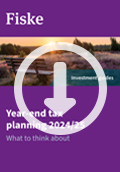Year-end tax planning 2024/25
What to think about

With the financial year-end rapidly approaching, there are a few measures that you may need to consider before midnight on April 5th – especially since the date falls before Easter so you will not be able to take advantage of that break to complete your tax return. Hopefully, this document will help you avoid a last-minute rush.
Why is year-end tax planning important?
 Every individual may claim certain tax reliefs and allowances associated with their earnings, savings and investments. By maximising these opportunities, you can pay less tax, pass on your wealth more efficiently and potentially retire earlier.
Every individual may claim certain tax reliefs and allowances associated with their earnings, savings and investments. By maximising these opportunities, you can pay less tax, pass on your wealth more efficiently and potentially retire earlier.
The allowances are reset at the start of every tax year, and – although there are some carry-forward opportunities – the general rule is ‘Use them or lose them’. Year-end tax planning will help ensure you do not pay any more tax than you need to.
Make the most of your ISA allowance
It pays to use as much of your ISA allowance as possible, because any investment returns are free from capital gains tax (CGT) and income tax.
If you already have one or more ISAs, you can maximise the benefits of your savings by investing up to £20,000 in an adult ISA (ISA) and up to £9,000 in a Junior ISA (JISA).
If you do not have an ISA yet and have a significant amount of cash to save or invest, you should invest what you can before the end of the tax year to make the most of your 2024/25 allowance – you cannot carry it over.
There are a couple of choices. Stocks & shares ISAs are the usual option for longer-term investment (five years or more), while cash ISAs – which are currently available at a rate that beats inflation – are suitable for money you might want to get hold of sooner. If you are unsure how to invest, you can put your money into a cash ISA now and transfer it to a stocks & shares ISA later. The government is considering withdrawing the tax-free benefit of cash ISAs.
Spread the money around if you have a lot in cash ISAs. There is a risk if you hold more than £85,000 in an individual bank or building society, as this is the limit of cover for each licensed UK financial institution.
If you are a parent or grandparent, consider opening a JISA for your children or grandchildren. The money is locked in until they are 18, and it is a way of enabling them to own shares.
Make full use of your pension
Most people can contribute up to £60,000 in a pension for the tax year 2024-25, although this can be reduced for those earning more than £260,000 per annum. Contributions qualify for income tax relief, which means the government pays extra money into your pension. This is why pensions are hard to beat as an investment. You can pay in a lump sum if you wish.
If you are a basic-rate taxpayer, you will get 20% tax relief
This means every £1 you pay in becomes £1.25 (because £1.25 taxed at 20% would become £1).
If you are a higher-rate taxpayer, you will get 40% tax relief
This means every £1 you pay in becomes £1.66. The 20% tax relief will be paid automatically, but you will need to claim the rest via your tax return. It may be worth speaking to an accountant about this.
Unlike with ISA contributions, it may be possible to carry back pension contributions for up to three years if you have not used your full personal allowance in a single tax year. This means you can still take advantage of the tax benefits. We recommend you seek professional advice to be sure of your personal position.
As the pension lifetime allowance (LTA) charge was abolished on April 6th 2024, there is no longer a limit on the total amount you can hold in your pension pot.
Currently, a pension can be retained and passed on to the next generation free of inheritance tax (IHT). However, it is planned that inherited pensions will become subject to IHT from April 2027, so you may wish to consider withdrawing funds from a pension pot now to use for a cash gift. There would be no IHT if you survive seven years.
From April 2026 tax will be payable on inherited agricultural assets worth more than £1 million.
The tax associated with pensions is complex, and you should speak to a tax adviser for more clarification.
Don’t forget about your tax-free dividend allowance
If you hold stocks and shares outside an ISA, up to £500 of income from dividends is tax-exempt.
Give money away
You can use gifting to reduce inheritance tax and preserve family wealth.
An individual can give away up to £3,000 each year. You can carry forward any unused gift allowance from the previous year. In addition, you can give £250 to as many individuals as you like in a year. There are also gift allowances available when someone close to you gets married – you can give £5,000 to a child, £2,500 to a grandchild or great-grandchild and £1,000 to anyone else.
Higher-rate taxpayers can claim income tax relief against their Gift Aid when donating to registered charities and Community Amateur Sports Clubs (CASCs). They can claim relief at 20% (and additional-rate taxpayers at 25%) of the gross value of the donations, while the charitable organisation can reclaim the basic rate of tax.
Claim for business expenses
Ensure you claim for tax relief on business expenses. It is available for things such as membership of a professional body and use of transport for business reasons.
Could you make more from your investment strategies?
Higher-risk, tax-efficient investments that may give higher returns include Venture Capital Trusts (VCTs), the Enterprise Investment Scheme (EIS) and the Seed Enterprise Investment Scheme (SEIS). These government initiatives are designed to encourage investment in early-stage businesses. As an investor, you can benefit from various tax reliefs. You will need to speak to a professional adviser before investing in one of these schemes, which are most suitable for high-net-worth individuals who can sustain the loss of the capital they have invested.
Reduce your taxable income
Consider taking action to reduce taxable income if you expect to earn between £100,000 and £125,140, as you will be taxed at a marginal rate of 60% on income in this range. Many people pay more into their pension, while those with a higher risk appetite may invest in a VCT, the EIS or the SEIS.
Keep hold of your child benefit payments
If possible, consider switching income from one spouse to another so that you both remain below the £60,000 threshold for High Income Child Benefit Charge.
Capital Gains Tax
When you dispose of shares by selling them or gifting them to another person or a trust you may trigger what is sometimes known as a “Capital Gains Tax event”. It means any gains are liable to Capital Gains Tax (CGT).
The following disposals are usually exempt from CGT:
- Gifts between spouses and civil partners
- Gifts to charity
- Sales, or gifts to others, of UK government gilts and Premium Bonds
- Sales of qualifying corporate bonds
- Sales of shares held in an ISA
- Sales of shares held in a Self-Invested Personal Pension (SIPP)
- Betting, lottery, or pools winnings.
The rates of CGT payable increased on 30th October 2024 and were announced in the Chancellor’s Autumn Statement.
For higher rate taxpayers (where annual income exceeds £50,270) CGT on gains realised after 30th October is now 24%. Gains up to and including 29th October are charged at the old rate of 20%.
For basic rate taxpayers where the capital gain, when added to their annual income, does not exceed £50,270, CGT is charged on realisations from 30th October 2024 at 18% (and 10% before).
If the gain, when added to annual income, exceeds £50,270, the portion falling below that level is taxed at 18% and the excess at 24% from 30th October (10% and 20% before).
Allowances and Capital Losses
Individuals receive an annual capital gains allowance of £3,000pa (2024/25). Only gains above this figure are liable to CGT. Trusts receive an allowance of £1,500. Unused annual exemptions expire; they cannot be carried forward.
Not all share disposals result in a capital gain. Where shares are disposed of at a loss the loss can be offset against gains in the same tax year. Unused losses can be carried forward to the following tax year and beyond up to a maximum of four tax years after the disposal. Because gifts between spouses and civil partners are exempt from CGT, you might consider gifting shares to them to make use of any unused exemption or capital loss they might have.
HMRC has stated that losses realised in 2024/25 may be offset against gains in whatever way is most beneficial to the taxable person.
As the annual capital gains allowance is now comparatively small (for comparison, it was £12,300 in 2021) and CGT rates have risen, capital losses should be used judiciously to minimise net taxable gains.
It is vital to record capital gains and losses as evidence when submitting
a claim to HMRC.
Consult and review
Sensible tax planning can save you thousands of pounds. But you should also review how your money is invested, since financial and tax planning is often about making prudent compromises.
If you hold too much in cash, you will suffer inflation risk. If you invest too much in high-risk assets, you may jeopardise your financial future.
Take advice if you have significant assets. You should review your finances at least annually.
We are always happy to talk with investors about how to invest wisely and appropriately, and our financial planner can advise on how to manage issues such as inheritance tax.
Please contact your Fiske Investment Manager if you are currently a Fiske client. Alternatively, if you are not currently a Fiske client, please call Monty Westall or Debbie Wellfare on +44 (0)20 7448 4700 to find out more.
Tax year-end checklist
- If you have not used your full £20,000 ISA allowance for 2024/25, top up by April 5th 2025.
- Have your children used their full JISA allowance of £9,000 for 2024/25? If not, make contributions on their behalf or encourage grandparents to make gifts before April 5th 2025.
- Have you contributed to a pension plan in 2024/25 and used up any available carry-back allowance?
- If your income is close to £100,000 and you are in danger of losing your tax-free personal allowances, think about upping your pension contributions.
- Have you considered using your allowances for the EIS (£1 million), VCTs (£200,000) and/or the SEIS (£200,000)?
- Have you and/or your spouse or civil partner used your full annual CGT exemption for 2024/25? Consider transferring an asset into joint names so you can both use your individual allowance when you come to sell the asset.
- Have you used your annual IHT gifting exemptions of £3,000 for 2024/25 and 2023/24?
- Do you have an up-to-date will?
- Consider how to manage your pension pot if you are concerned that your pension will be subject to IHT when it passes to the next generation.
- Set up a JISA or pension for your grandchildren and thus improve your IHT position.
- If you are making gifts to charity, ensure they are made by April 5th 2025 so that you will get tax relief at your highest rate.
Fiske plc. Registered office: 100 Wood Street, London, EC2V 7AN
Member of the London Stock Exchange Authorised and Regulated by the Financial Conduct Authority
Registered in England No 02248663 VAT No. 489 1881 31




